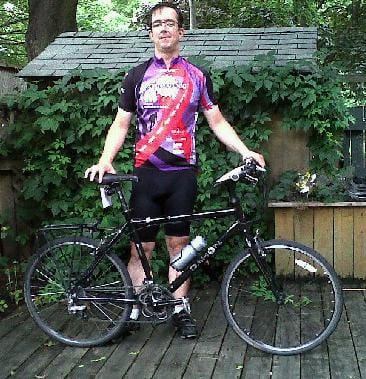In the 12 years since the Toronto People with AIDS Foundation started its annual Friends for Life Bike Rally, it’s become a common joke among participants that the six-day, Toronto to Montreal trek isn’t long enough. Riders, elated upon reaching Montreal often pledge, jokingly, to keep going, all the way to Halifax.
When 40-year-old pharmaceutical engineer Todd Tyrtle heard that, he thought, “Well, why not?” Returning for his second year on the rally, Tyrtle has made Halifax his destination and has asked his donors to make it happen.
“If I raise $3,500, I’ll ride to Quebec City,” he says. “$5,000 to Charlottetown, $6,000 to Halifax.”
Last year, after a gruelling summer of training rides and the first couple of days trudging up the hills of Ontario, Tyrtle found the last few days of the rally an easy ending. Meanwhile, however, “I saw a lot of people much older than me doing the ride, people dealing with various physical challenges, even smokers. They were putting a lot more effort into it than I was.”
Like a lot of riders, he signed on initially because the physical challenge of a 600-kilometre trip appealed to him. But on the fourth night of the journey he realized the rally was much more than just a personal challenge. Participants gathered on a beach, lit candles and shared stories and memories of the impact of AIDS in their lives.
“For me, that was a real eye-opener, especially given my sheltered upbringing,” Tyrtle says.
Born in Texas, Tyrtle was an army brat until his family settled in Vermont when he was seven.
“Vermont is a fairly progressive state, but I didn’t know anybody out at all in high school,” he recalls. “Now, I know there were several who’ve come out since, but we did not talk about it then. At the same time, my dad was an army recruiter… I was raised by a very Republican person.”
Between these two influences, he says, “I learned to form my own opinions.”
During the Bush years, Tyrtle brought his wife and son to Toronto.
“My dad and I haven’t talked in 20 years, and apparently he’s gone all Tea Party now,” he says.
Joining hundreds of queer people on the rally, he says, “certainly doesn’t feel like my typical life, but it doesn’t feel odd at all. It’s like going to the Pride parade; it’s a vision of the future. Everybody is just being who they want to be.”
Toronto itself has been inspiring, Tyrtle says. “I’ve never lived in a city that’s so engaged. Not everybody, obviously, but there’s a lot of people who really love this city and want to see change. They say, ‘I wish it were like this,’ but they don’t stop there; they try and make something happen.”
For his part, Tyrtle is still trying to find ways to expand his fundraising.
“Most people I know have never heard of the rally,” he says, but the response so far has been encouraging. “Social media has been amazing. At one point, Holly Johnson from Frankie Goes to Hollywood retweeted one of my pitches.”
Meanwhile, he says, “My wife and I raffled off our iPods, I sold two homemade Thai dinners… Why stop now? I’m only just now figuring this stuff out. Even if you just end at Montreal, it’s an awesome experience, but I’m going to see what I can do to go further.”


 Why you can trust Xtra
Why you can trust Xtra


